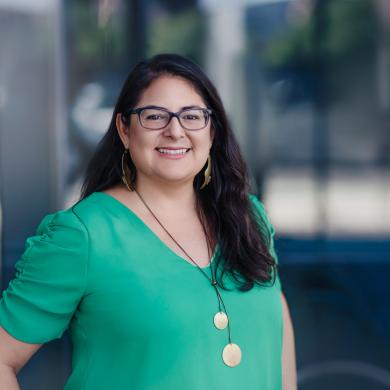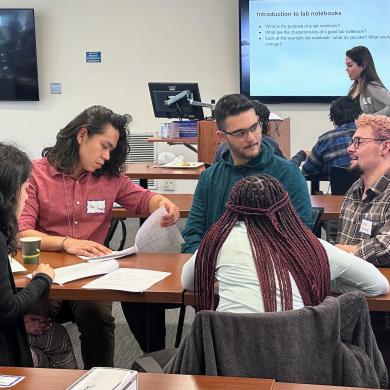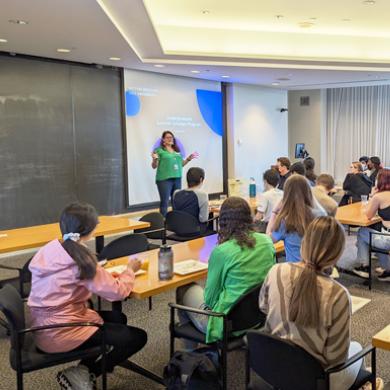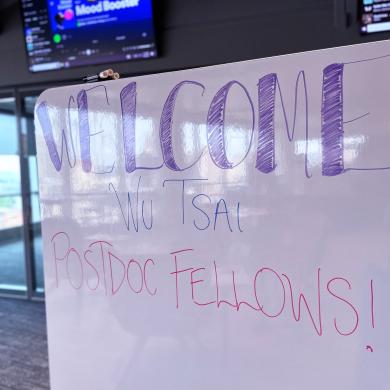Building a science community
A conversation with Giovanna Guerrero-Medina
Giovanna Guerrero-Medina, PhD, joined the Wu Tsai Institute in 2021 as Assistant Director of Diversity, Equity, and Inclusion. Her hiring was one of the Institute’s first actions, in recognition of the critical importance of uniting people from diverse backgrounds and disciplines for achieving a scientific goal as ambitious as understanding human cognition. Her early influence allowed the Institute to bake best practices and innovative models for inclusive science into the design of all programs and activities. We asked Dr. Guerrero-Medina to reflect on her impactful work with the Institute over the past three years.

How do diversity, equity, and inclusion efforts in science align with the goal of advancing our understanding of cognition and encouraging interdisciplinary inquiry?
Guerrero-Medina: Decoding the complexities of the mind is an ambitious goal, and homogenous thinking is not the right approach for this expansive problem. To be innovative, agile, and transformative, we must foster a community that welcomes anyone and everyone who has something to contribute.
When I started at WTI one of our first priorities was establishing programs that would seed and grow a community of researchers who excel at the interface of fields and can serve as bridges across disciplines. So, we have invested in scientists who understand the importance of diverse perspectives and inclusive environments and are interested in developing their competencies in these areas. In all of WTI’s talent recruitment programs—undergraduate, graduate, and postdoctoral fellowships and faculty recruitment—this is one of several criteria we consider holistically.
Nominated by over 40 mentees, Guerrero-Medina was recently recognized as an Outstanding Research and Professional Mentor at the 2023 National Diversity in STEMM Conference of the Society for the Advancement of Chicanos, Hispanics, and Native Americans in Science (SACNAS) for mentorship in the NIH-funded Yale Ciencia Academy (YCA).
How does the recent recognition from SACNAS reflect your outreach strategies? What have you learned from your mentees?
Guerrero-Medina: Mentoring is critical for entering and thriving in science and technology, and YCA is one of the most important programs I have led in my twenty-year career. The program provides graduate students from underrepresented backgrounds with culturally similar role models, a support community, and training for self-advocacy, communications, leadership, and career planning skills. Many of my YCA mentees are now amazing mentors and scientific leaders in their own right.
Mentorship has shown me the importance of asking questions and listening, of reinforcing the integration of social and scientific identities, and encouraging students to identify and advocate for their needs. It has also shown me that, unfortunately, research mentoring experiences can be highly variable across - and even within - training programs. Academic institutions have far to go in supporting and being accountable for good mentoring. Many students have experienced microaggressions, benign neglect, burnout, or training environments that were not supportive. For good science to be produced, people need to feel supported to develop their research interests and careers. This just further emphasizes the importance of improving mentor training at all stages.



How have the Institute’s DEI efforts developed since 2021, and how are they represented among our community?
Guerrero-Medina: It has been a whirlwind of exciting work and activities to build our central programs and initiatives. I am proud that our efforts have brought a crop of scientists—undergraduate, graduate, and postdoctoral fellows and faculty members—who have enriched our community through their diverse identities, fields of research, approaches, perspectives, and interests.
Three years in, I see how the care put into developing these programs and strategies has paid off in the bright minds attending our seminars and events and the diverse life experiences lining the corridors of 100 College. The engagement and activities of WTI's Student and Postdoc Committee embody the Institute's vision. I am also proud of our faculty recruitment efforts. From outreach strategies to rubrics and assessments to to faculty visits and interviews—we have been careful to design a process that is fair and equitable in addition to prioritizing candidates who integrate inclusion and support for diverse perspectives in their teaching and mentorship.
As a result, WTI hired three outstanding women scientists, Emilia Favuzzi (Neuroscience), Shreya Saxena (Biomedical Engineering), and Kia Nobre (Psychology), and helped recruit several other diverse investigators to Yale. Subsequently, I have shared our process and materials with other search committees across the University interested in replicating our efforts. This is the type of systemic change that we strive for. Now that these programs are in place, I am shifting my focus to support faculty and leaders in establishing supportive training environments.
Mentorship has shown me the importance of asking questions and listening, of reinforcing the integration of social and scientific identities, and encouraging students to identify and advocate for their needs.
Giovanna Guerrero-Medina, PhD, Assistant Director, Diversity, Equity and Inclusion, Wu Tsai Institute; Director, Yale Ciencia Program; Director, Ciencia Puerto Rico
The Institute's research community spans over 35 departments and fields across six schools at the University; what is the approach to addressing broader systemic challenges to equity and to fostering inclusive science?
Guerrero-Medina: As a member of the committee that published the recent report on Advancing Anti-Racism, Diversity, Equity and Inclusion in STEMM Organizations, I am interested in tackling systems that have historically excluded people from full participation in science. Higher education scholars Julie Posselt and Lorelle Espinosa describe systemic change as improving connections, creating levers, managing complexity, and revisiting outcomes. I want WTI to expand connections with minority serving institutions and the local New Haven community, to include our members in refining, owning, and championing equity and inclusion goals, and to establish systems to track our progress and reassess strategies as needed.
Because the Institute's work transcends departmental boundaries, we have a unique opportunity to influence systems, cultures, and practices across the University by demonstrating the benefits of centering diverse perspectives, equitable approaches, and supportive environments. Just like WTI's mission is ambitious, I am also incredibly ambitious about helping to advance a more inclusive community for science at Yale.
